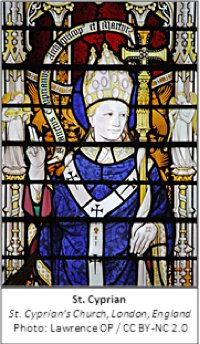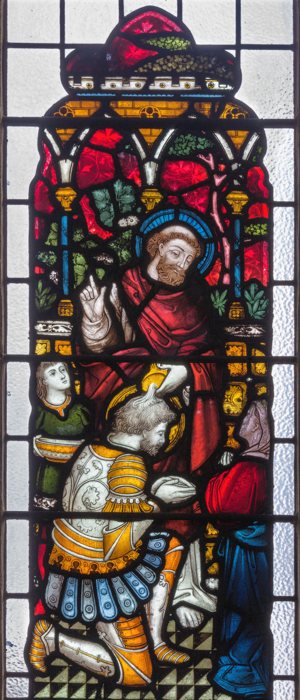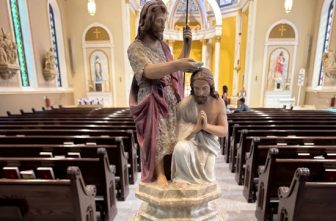Saints Cornelius (d. 253) and Cyprian (200-258) are two great Third Century saints, one a Pope, the other a bishop, one in Rome, the other in North Africa, both martyrs, both mentioned in Eucharistic Prayer I, the Roman Canon.
 They are celebrated together because Bishop Cyprian was an ally of Pope Cornelius. Cornelius was chosen as Pope in 251 AD over the objection of Novatian, who claimed the papacy for himself and was the first antipope. Cornelius and Novatian took opposite positions in the lapsi controversy. The lapsi were those who had “lapsed” from the faith during the persecution of the Roman emperor Decius (249-251 AD). The lapsi renounced their Christianity to save themselves from martyrdom. When the persecution subsided, the lapsi sought to be readmitted. Novatian, a rigorist, declared that the sin of apostasy was so grave that those who had disowned Christ and the Church could not be forgiven, reconciled with the Church, or readmitted. Cornelius, on the other hand, took a more compassionate stance and held that the Church had the power to reconcile and readmit the lapsi after a period of penance. Cyprian traveled to Rome to be part of a synod of bishops that upheld Cornelius’ authority as Pope and excommunicated Novatian and his followers. The first reflection in the Office of Readings is a letter of support and encouragement that Cyprian sent to Cornelius shortly before his death.
They are celebrated together because Bishop Cyprian was an ally of Pope Cornelius. Cornelius was chosen as Pope in 251 AD over the objection of Novatian, who claimed the papacy for himself and was the first antipope. Cornelius and Novatian took opposite positions in the lapsi controversy. The lapsi were those who had “lapsed” from the faith during the persecution of the Roman emperor Decius (249-251 AD). The lapsi renounced their Christianity to save themselves from martyrdom. When the persecution subsided, the lapsi sought to be readmitted. Novatian, a rigorist, declared that the sin of apostasy was so grave that those who had disowned Christ and the Church could not be forgiven, reconciled with the Church, or readmitted. Cornelius, on the other hand, took a more compassionate stance and held that the Church had the power to reconcile and readmit the lapsi after a period of penance. Cyprian traveled to Rome to be part of a synod of bishops that upheld Cornelius’ authority as Pope and excommunicated Novatian and his followers. The first reflection in the Office of Readings is a letter of support and encouragement that Cyprian sent to Cornelius shortly before his death.
Little is known about the beginning of Cornelius’ life. It seems that he was born into an aristocratic family in Rome, and he was ordained a priest. His predecessor, Pope Fabian (papacy, 236-250 AD), died as a result of brutal treatment in prison on January 20, 250. The persecution of Decius was so intense that it was impossible to conduct an election over the next fourteen months. In March, 251, Decius left Rome on a military expedition and died during the campaign, and in his absence an election was held and Cornelius was chosen. The new Roman emperor Gallus resumed the persecution against the Church; Cornelius was arrested in June, 252, and confined to prison in Civitavecchia, where he died in June, 253, as a result of his physical hardships. His remains were interred in the cemetery of St. Callistus.

St. Cyprian was born of pagan parents in Carthage, North Africa, in 200 AD. He had a brilliant mind, and was a lawyer and gifted orator. He converted to Christianity in 245 at the age of 45. He was ordained a priest in 248, one year later was selected as the bishop of Carthage, and quickly became the leader of the bishops of North Africa. He battled multiple heresies which he believed were more dangerous to the Church than the persecutions. He declared that baptisms administered by heretics were invalid. He wrote De unitate ecclesiae, The Unity of the Church, to promote Church unity, to oppose Novatian and his position that the lapsi could not be readmitted to the Church, and to correct erroneous teachings espoused by various bishops. He coined the famous phrase, “One cannot have God for his Father, who has not the Church for his mother.” He was arrested under the persecution of the emperor Valerian, condemned to death by the Roman governor Galerius Maximus, and beheaded on September 14, 258. He was the first African bishop to suffer martyrdom and is the patron saint of North Africa and Algeria.





Supporting God’s gift of life